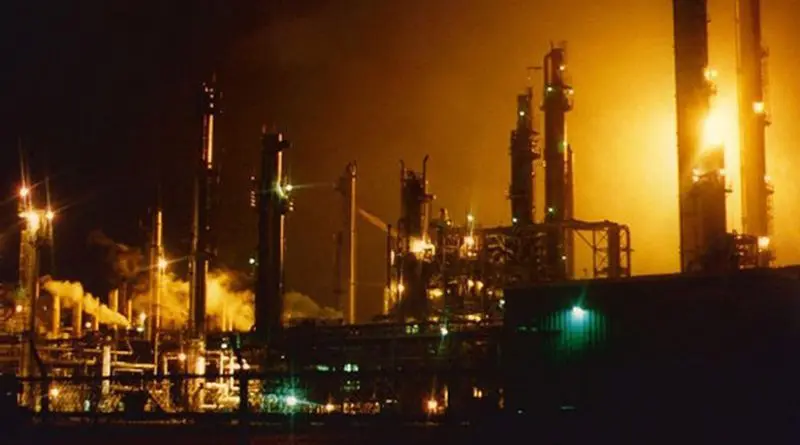Saudi Arabia And Russia Agree To Freeze Oil Output
By Arab News
Top global producers Saudi Arabia and Russia have agreed to freeze oil output in a bid to shore up prices after a 70 percent drop due to chronic oversupply.
According to AFP, Petroleum and Mineral Resources Minister Ali Al-Naimi said the move — which is conditional on other major producers joining in — was designed to stabilize the market following the dramatic price fall since mid-2014.
Further talks involving Iran and Iraq are due in Tehran on Wednesday.
“We don’t want significant gyrations in prices. We don’t want a reduction in supply. We want to meet demand and we want a stable oil price,” Al-Naimi was quoted as saying in the report.
The announcement followed a meeting in Doha between Saudi Arabia, Venezuela, Qatar and Russia.
“Following the meeting, all four countries are ready to freeze oil production at January levels, if other major producers do the same,” said Russia’s Energy Minister Alexander Novak.
Al-Naimi said Tuesday’s decision was “the beginning of a process which we will assess in the next few months and decide whether we need other steps to stabilize… the market.”
“The reason we agreed to a potential freeze of production is simple: It is the beginning of a process which we will assess in the next few months and decide if we need other steps to stabilize and improve the market,” Al-Naimi was quoted as saying by Reuters.
Oil prices jumped to $35.55 per barrel after the news about the meeting but later pared gains to trade near $33 on concerns that Iran may reject the deal and that even if Tehran agreed it would not help ease the growing global glut.
In early afternoon London deals, Brent North Sea crude for delivery in April was up 50 cents at $33.89 per barrel.
US benchmark West Texas Intermediate for March delivery added 41 cents to $29.85 a barrel from Monday’s closing level.
“The news has actually disappointed the market slightly because some people had hoped to see a cut rather than a production freeze,” said City Index analyst Fawad Razaqzada.
Qatar’s Energy Minister Mohammed bin Saleh Al-Sada said “intensive communications” would start immediately with other OPEC and non-OPEC producers, including Iraq and Iran, to win their support.
Iran said it would host talks with Iraq and Venezuela in Tehran on Wednesday, and left the door open to joining efforts to stabilize the market.
“There’s room for discussion and examination of this issue,” Oil Minister Bijan Zanganeh said.
But he insisted Iran intends to maintain its share of the market.
“What is important first of all is that right now the oil market faces an output surplus and, secondly, Iran won’t relinquish its share,” Zanganeh said.
Prices have come under renewed pressure by the return of Iran to world markets after the lifting of international sanctions linked to its nuclear program.
The effort to bring other producers on board may prove complicated and the market response was muted.
In a research note, Danske Bank said the move would have little impact on reducing oversupply as “recent estimates suggest that both Russia and Saudi Arabia produced at levels close to a record high in January.”
“The two leading oil producers have basically committed not to take any imminent action to reduce the current global overproduction,” it said. And Natixis analyst Abhishek Deshpande said that there was a “low probability” that Iran and Iraq would quickly agree to a freeze.
“That essentially is a production cut for them” as both were planning to boost output this year, he said.
Iran has pledged to steeply increase output in the coming months as it looks to regain market share.
“Our situation is totally different to those countries that have been producing at high levels for the past few years,” a senior source familiar with Iran’s thinking told Reuters.
Russian Deputy Prime Minister Arkady Dvorkovich said freezing output was not a problem for his country as he anyway expected its production to be flat this year versus 2015.
Riyadh has said earlier that it would consider output cuts only if other producers agree to follow suit.
Russia in particular has seen its recession-hit economy damaged by the slump.
Analysts pointed out that, with the possible exception of Saudi Arabia, the parties to the agreement are already pumping at capacity, making a “freeze” somewhat pointless.
“This freeze in no way changes market fundamentals because none of the four countries had been expected to increase production significantly any more,” energy expert and university professor emeritus Jean-Marie Chevalier told AFP in Paris.
Natixis analyst Abhishek Deshpande told AFP that the exact January date was vital to Tuesday’s deal.

